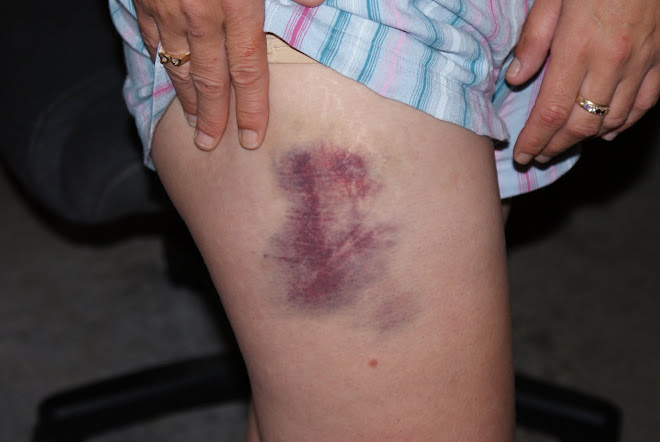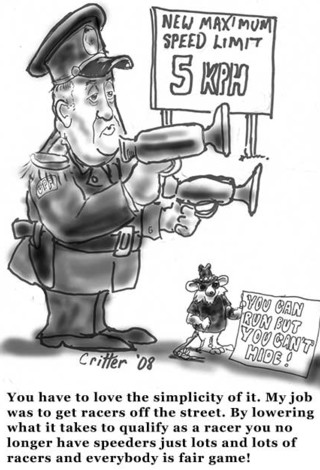Jan 26, 2008
I'm a huge supporter of the police, but you wonder who counsels them on public relations.
They wonder why the driving public often does not co-operate with them, when they pull stunts like they did March 24 last year.
Brad Diamond, producer of TSN's Motoring 2008 (full disclosure: I appear on this show) lives near Broadview and Danforth Aves. Every Saturday morning he goes out for his usual four-buck coffee.
On this day he was driving westbound on the Prince Edward Viaduct, which connects Danforth Avenue and Bloor Street across the Don Valley. He spotted a radar trap nailing eastbound drivers, and passed it at approximately 49.999 km/h. It's there all the time so it was no surprise to him.
Of course, like most concerned citizens, he has often wondered: if radar is supposed to be a traffic safety measure, why would they run it on a bright sunny Saturday morning, on a three-lanes-each-way bridge, with excellent visibility in all directions, without a single intersection, store, home, school or in fact much human activity at all?
Surely, there are more dangerous places they could be trying to slow people down?
Let alone more important public safety initiatives the police could be doing?
Can you say "fishing hole," boys and girls?
Okay, so speeding is speeding, and speeding is against the law everywhere. But seriously.
As any concerned citizen would do if he knew someone was possibly going to break a law – especially if he knew the cops were lying in wait at the potential scene of the crime – Diamond flicked his headlights at oncoming traffic.
As you would. And as you would, most of the oncoming traffic did slow down.
Now, still assuming, perhaps naively, that slowing traffic down to make the roads safer is the objective of radar (it never works, but that's a story for another day), you'd think the cops would be happy that Diamond was assisting in their cause.
You'd think they'd want everybody flashing their headlights, all the time. Who'd take a chance at speeding then?
But no, stationed at the west end of the bridge were a couple more cruisers, pulling people like Diamond over for warning people about the radar trap.
$110 and no points.
I checked the Highway Traffic Act (HTA). I could find no reference to radar speed traps at all, let alone anything about it being illegal to warn other drivers about them. After all, traffic reporters and some websites even announce their locations.
The ticket said the offence was "flashing head beams" in contravention of the HTA, section 169.
Never mind that I have been in the car game for more than 30 years and have never heard the term "head beams."
I checked section 169 and nowhere does it mention radar traps in there.
Sgt. Cam Woolley of the Ontario Provincial Police told me that this law was put in place a few years ago to prevent "civilian" vehicles from impersonating emergency vehicles, notably tow trucks trying to bully their way through traffic to be first on the scene of a wreck.
Nothing at all about radar.
What's more, Diamond's Chevy Tahoe was not producing "alternating"' flashes of light. "Alternating" means one, then the other (just like police cars and other emergency vehicles can do), not both on/both off.
Not only was there no harm, there was no foul.
In our legal system, the legislature passes the laws, the police enforce them. It is not up to the police to make up their own laws – that's what they call a police state.
If the legislature decided in its collective wisdom to make warning of radar speed traps illegal, how hard would it be to pass an unambiguous law to that effect?
I can even help: "It is unlawful to warn other drivers about upcoming radar speed traps; never mind that they don't improve traffic safety."
Okay, the legislature might choose different wording.
The fact is, the legislature has not chosen to pass a law like this, or anything remotely like it.
If Diamond had been standing on the sidewalk holding a neon sign reading, WARNING! RADAR AHEAD!', there would have been nothing the cops could have done.
Needless to say, he decided to fight the ticket.
He contacted the prosecutor, saying the law in question had nothing at all to do with what he allegedly had done, but she said they were going to proceed with the court case.
Okay then, Jan. 10 it would be.
I had a 30-page script ready to go as Diamond's representative. (My dad, who was a lawyer, would have been proud of me. I hope.)
At traffic court, you first present yourself to the prosecutor, who asks how you're going to plead. You'd think anyone who didn't just pay the ticket in the first place and who had shown up at 9 a.m. to fight it would plead not guilty, but some didn't.
You also may have the option of pleading guilty to a lesser charge, which the first case of the morning did.
We were about fourth on the docket.
The prosecutor called Diamond to the bench, asked his name, read the charge, and asked how he pleaded.
"Not guilty, your worship,"' he responded.
Then the prosecutor said, "The police officer has no evidence in this case, your worship."'
"Case dismissed,"' said the justice of the peace.
WHAT? The police officer has "no evidence"? If he had no evidence, why the heck did he lay the charge in the first place?
The fact is, he had no law upon which to base the charge, because Diamond had not done anything illegal.
They assume that you will assume you had in fact done something illegal, fork over your cash, and they smile all the way to the bank.
Now, dad always said that in court, you take a win any way you can. But we were disappointed not to take it to trial so as to set a precedent against this little Buford T. Justice scam by the Toronto Police.
Someone more paranoid than me might suspect they did not want it to go to trial for that very reason, so as not to put their scurrilous behaviour on the trailer for all time.
Now, maybe the "no evidence"' gambit is traffic court shorthand for "the cop didn't show up." But usually with fishing holes, they expect a certain number of people to fight the tickets and schedule the cop for court duty.
I guess we'll never know.
I don't blame the individual cop here, although some of them are clearly overzealous in their pursuit of tickets, quotas, or whatever other pressures they face from their superiors.
But I think it is disgusting that police management sends cops out there to lie in wait to ticket unsuspecting law-abiding citizens when they have to know that what they're ticketing them for is not against the law.
And if they didn't know that before, they sure do now.
Toronto Star
Wednesday, October 8, 2008
Subscribe to:
Post Comments (Atom)
They had No Choice!

They wore these or I took away thier toys for 7 days!
"Damn Street Racer"pays with Brusies


















No comments:
Post a Comment